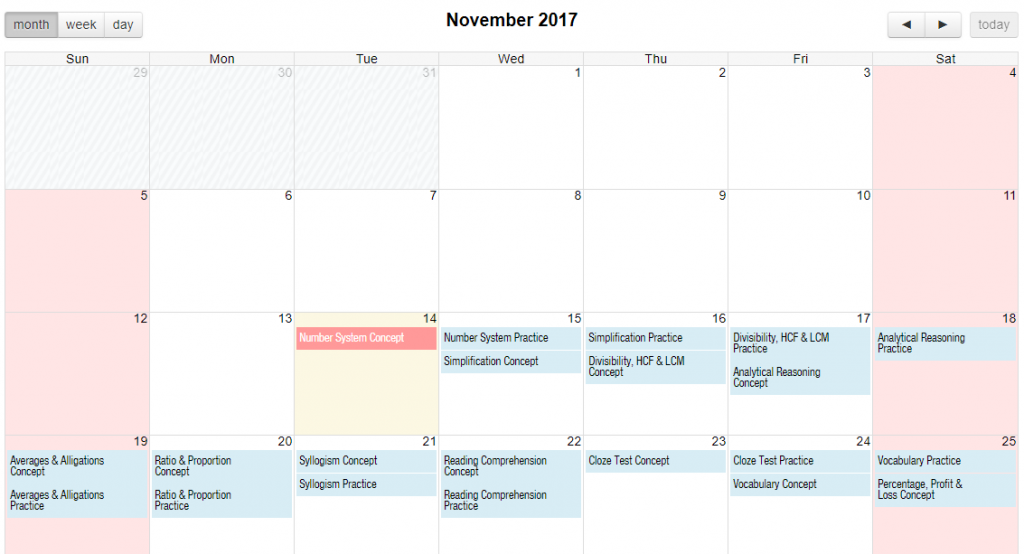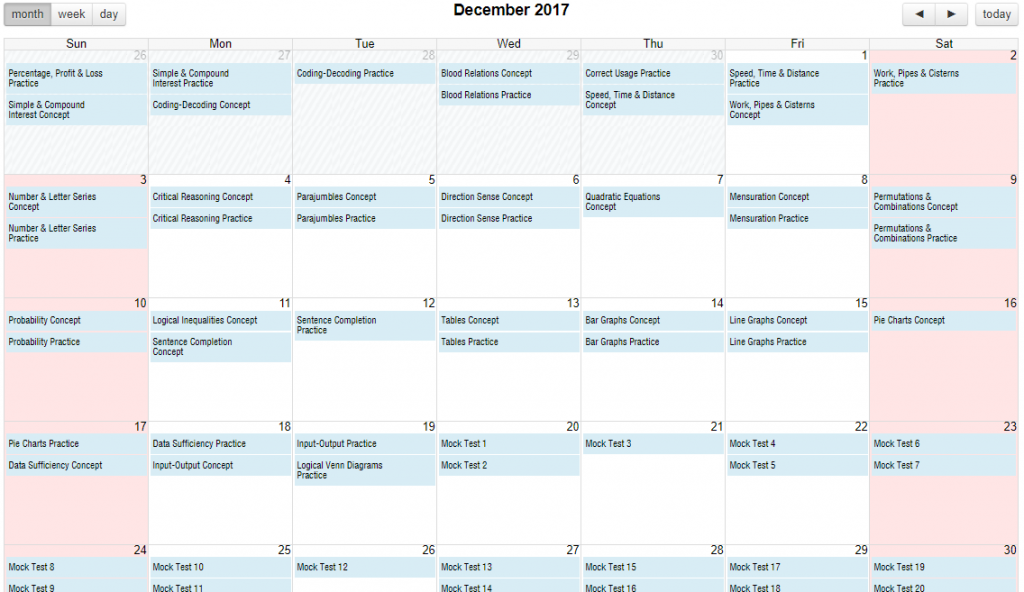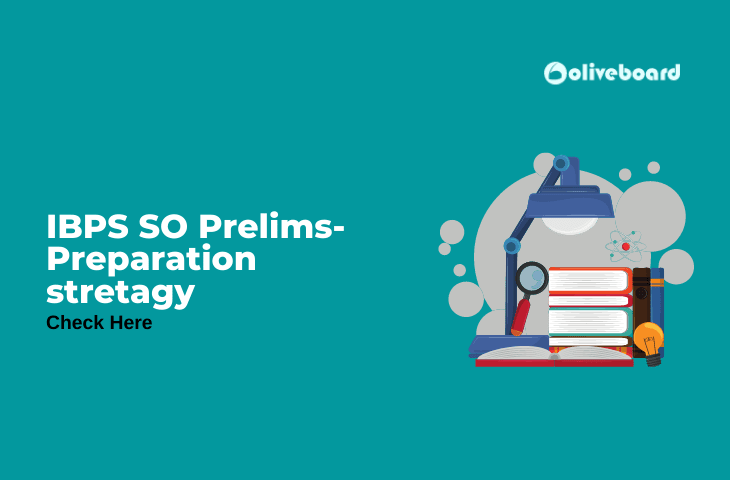The IBPS SO Preliminary Examination is scheduled on 26th December 2021. With just 45 days remaining for the prelims, we hope you have already started your preparation. For your assistance, today we bring to you IBPS SO Prelims 2021 – 45 days study plan. This plan will help you prepare for the exam in a systematic and structured way ensuring you don’t miss any important topics and score well in the exam.
Here, we have used Oliveboard’s dynamic study planner to create a 45-days study plan for IBPS SO prelims (IT and Marketing Officer). You can also use it to track your preparation progress as well.
IBPS SO Prelims 2021 – 45-Days Study Plan
You can use this plan to study and revise for the IBPS SO exam. There is practice after each topic to ensure that one concept is clear before moving to the next. You can also customize your study plan as per your comfort level and strength and weak areas. To create a customized study plan, click here.


IBPS SO 2021 Prelims – English Language
- Reading Comprehension
- Cloze Test
- Fillers
- Sentence Errors
- Vocabulary based questions
- Sentence Improvement
- Jumbled Paragraph
- Paragraph Based Questions
Be Prepared for Surprises
The IBPS PO prelims 2021 took many candidates to surprise in the English section. Therefore, candidates should be prepared for such surprises. The error spotting questions were of a new type although the general method of solving was the same. The options were changed. Instead of the traditional type where one had to identify the part of the sentence that had an error, this year, students had to choose the combination of sentences which did not have an error. The RC passages were also not easy with some indirect questions although there was relief in the form on 4-5 vocabulary based questions. The phrase replacement questions had a portion of the sentence as bold and one had to find a better replacement for the portion in bold.
Recommended Books
- High School English Grammar and Composition by Wren & Martin
- Word Power Made Easy by Norman Lewis
Tips to Prepare
- Get a basic understanding of all grammar rules
- Improve your vocabulary by reading newspaper everyday
- A good reading speed gives you an edge to score well in the exam, so make sure while preparing for RC you also work on your reading speed.
IBPS SO 2021 Prelims – Reasoning
- Puzzles
- Seating Arrangements
- Direction Sense
- Blood Relation
- Syllogism
- Order and Ranking
- Coding-Decoding
- Machine Input-Output
- Inequalities
- Alpha-Numeric-Symbol Series
- Data Sufficiency
The Reasoning section tests your problem-solving, decision-making skills and logical abilities. It takes consistent practice to master these skills. Start spending some time solving puzzles online, like Sudoku, Crossword puzzles, Mind bender puzzles, etc. These will sharpen your skills and train your brain to think logically.
Last year, questions from this section were difficult. There were 5 questions each from Syllogism, Inequalities, Coding/Decoding, Input/Output. There were 3 sets of puzzles and rest of the questions were from Ranking, Direct Sense, Blood Relation etc.
Recommended Books
- Modern Approach to Verbal and Non-Verbal Reasoning by Dr. R.S. Agarwal
- Analytical Reasoning by M.K. Pandey
- Magical Book of Puzzles by K Kundan
Tips to Prepare
- Categorize reasoning topics as simple, medium and complex. Attempt in the same order in the exam.
- Solve puzzles online to sharpen your logical thinking
- Practice topic-wise tests, identify your weak areas and focus on those more
IBPS SO 2021 Prelims – Quantitative Aptitude
- Data Interpretation
- Inequalities
- Number Series
- Approximation and Simplification
- Data Sufficiency
- Arithmetic Problems
While it is important to learn all the concepts across all the topics of IBPS PO Prelims Quant and practice them, it is equally important to learn them in an order. Most quant topics are interdependent, meaning, you need to know concepts of one topic to understand or solve another. For instance, most Quant topics require you to apply concepts of Interest, Percentage and Profit & Loss.
Last year, the section had easy to moderate level questions. The maximum number of questions were from simplification/approximation. There were 5 questions each from number series and quadratic equations and 2 sets from data interpretation. Rest of the questions were from topics like partnership, profit/loss, average, time & work etc.
Recommended Books
- Quantitative Aptitude Test by N.K. Singh
- Quantitative Aptitude for Competitive Exams by R.S. Agarwal
- Kiran’s text book of Quickest Mathematics
Tips to Prepare
- Start with topics that form the base for other topics and then move on to higher-level difficult topics
- Improve your calculation speed by memorizing tables, practicing mental math and learning Vedic math tricks. Read how to improve your calculation speed, here
- Practice tests of different difficulty level – start from easy and move to difficult.
Analyzing Mocks – How to do it properly
In the study plan, mock tests are recommended almost every day, especially towards the end. Analysing mocks is as important as attempting them. Unless you analyse your performance, your preparation strategy won’t be fruitful. Here’s how to analyse mocks properly.
- Review the Wrong Questions. Find where your concept or approach went wrong. Click on “Review Wrong” and this takes you through solutions of only the wrong attempts.
- Attempt the Un-attempted ones. You can take an un-timed test of only the Un-attempted questions in the mock test. Click on “Review Un attempted” and this allows you to attempt all the ones left unanswered.
- Review the Correct Answers. Check if there were better solutions or approaches to the one you adopted.
- Practice tests from your Weak Areas. Oliveboard’s Adaptive Engine figures the top three areas that you need to work on the most based on your performance data and gives you lessons and tests on those topics. After each mock test, find new lessons + tests on your weak areas by visiting the “Improve” section.
- Analyse Graphs. These are detailed reports on your time spent & accuracy section-wise, along with benchmarking reports on your score and percentile.
Start Practicing and Analyzing Mock Tests Now!
Hope this helps. If you have any questions or want us to write on any topic, please mention in the comment section below.
All the best for the exam!

The most comprehensive online preparation portal for MBA, Banking and Government exams. Explore a range of mock tests and study material at www.oliveboard.in
Oliveboard Live Courses & Mock Test Series

